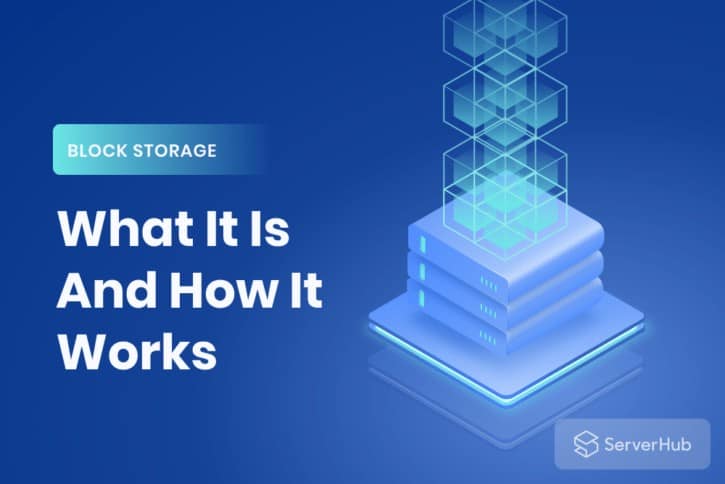In our day an age, having flexibility and scalability in your Data Storage system is one of the most essential things for a user pursuing to make use of a Virtual Private Cloud (VPC). Whether it is to build an application or to create a redundant back up system for all your personal data (images, videos, text, etc..), storage will remain one of the most important things to keep in mind.
Unfortunately, data is endless. One day, your little cloud project only needs 250 GBs and the next you are in dire need of another TB to add to that. Does that necessarily entail that you have to deploy yet another VPC to fill that gap (or to get an extra gap to fill)? The answer is no. You can solely and mainly rely on Block Storage.
So how exactly does Block Storage work?
Block storage is a service that functions the same way a Hard Drive does but over the network. Since it functions virtually, it is a service that most Cloud Providers offer by attaching segments of storage space of any size into your Virtual Machine, granting your VPC more storage space to store your data.
After your block storage is attached, it works like a normal hard drive. You can change its format, configure a database on it, store all the data you need on it, and change its system settings.
So far, it’s the same as having a normal hard drive, but remember, block storage is set up on the cloud and this gives it some unique advantages over a normal hard drive:-
- Scalability: Since it is an addition to your VPC, you can increase/decrease your Block Storage size however much you need.
- Flexibility: Block Storage devices can be very easily detached from a virtual machine and attached into another.
- Back up: You can take Live Snapshots of your device’s current status and then back up to it whenever you want.
Now that you know what Block Storage is and how it functions, here are some Pros and Cons to having Block Storage in your VPC:-
Pros:-
A) Low Latency:-
Block Storage devices are equipped with cutting edge highest-in-the-market level speeds.
That’s why no matter how much space you use, you can access all the files and data you have without any or with very low latency.
B) Well Supported:-
Block Storage devices are usually supported by an arsenal of programming languages.
This allows any/all programming languages to read, write, edit, configure, and install anything on the Block Storage device.
C) Ease of Use:-
Block Storage is not complicated. Normal users can comfortably install and set up any kind of Software without hassles or issues.
This also means that the access controls and Filesystem permissions can be easily understood and used.
Cons:-
A) Cost Control:-
With Block Storage, cost is based on the storage space you purchased rather than the storage space you used.
This sometimes can cause a user to pay for space that they’re currently not using.
B) Access Limitations:-
Block Storage can only be accessed through a running server. If your VPC is down or you are in a situation where you don’t have access to it, you may not be able to access your Block Storage.
In addition to that, Block Storage can be somewhat static. Though it is easy to move block storage from one server to another, it can only be attached to one server at a time.
Conclusion
Block Storage is a great way to store data. in fact, it is much more commonly used than Object Storage.
If you are looking for a reliable easy-to-carry cloud based way to store heavy data with very low latency and high speeds, then make sure to add some Block Storage to your VPC with the size you need.
For more informative articles, make sure to follow ServerHub’s Knowledgebase.
